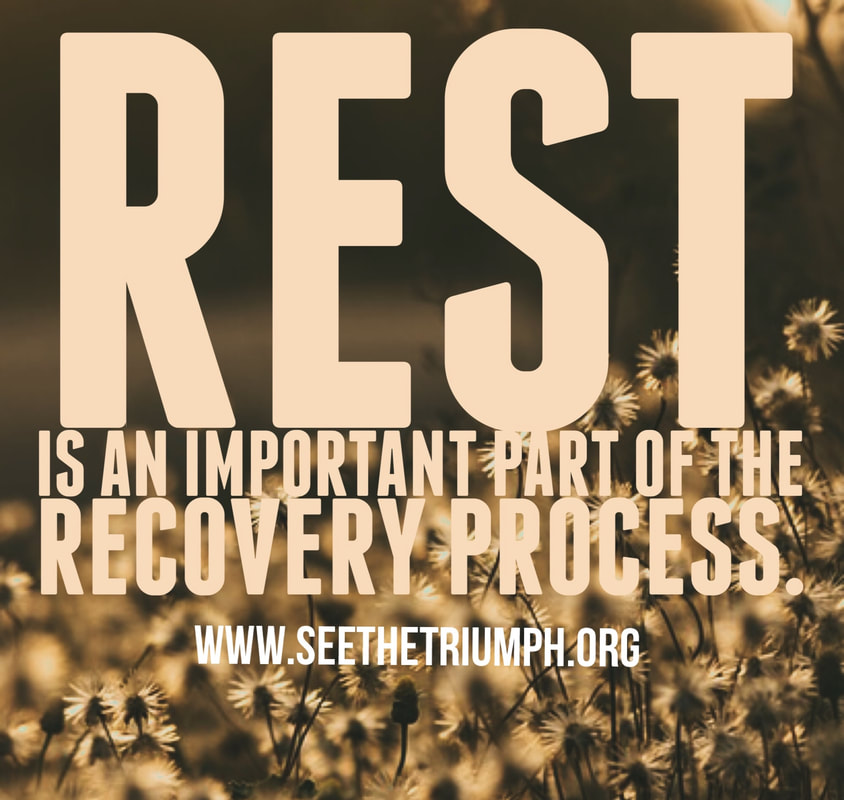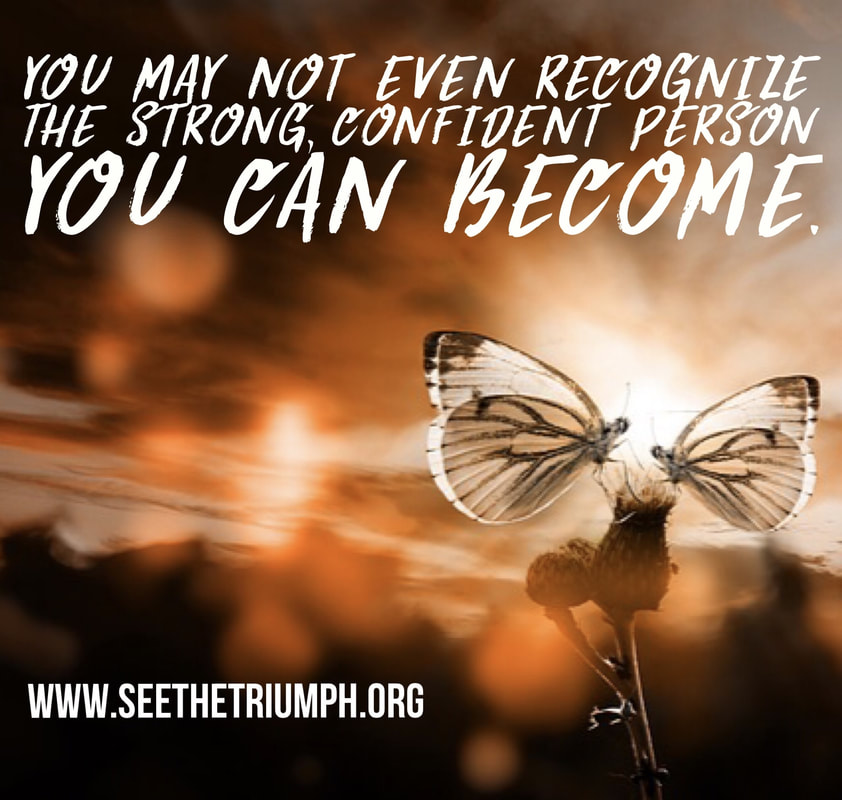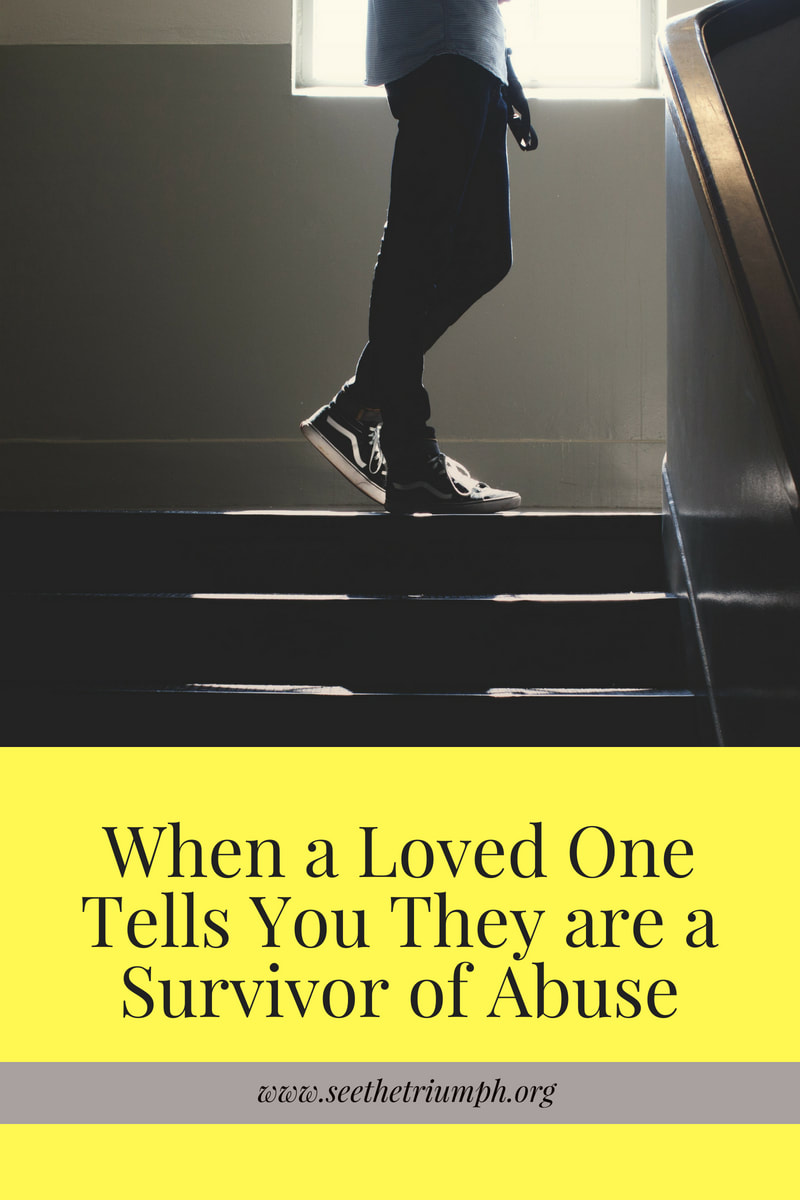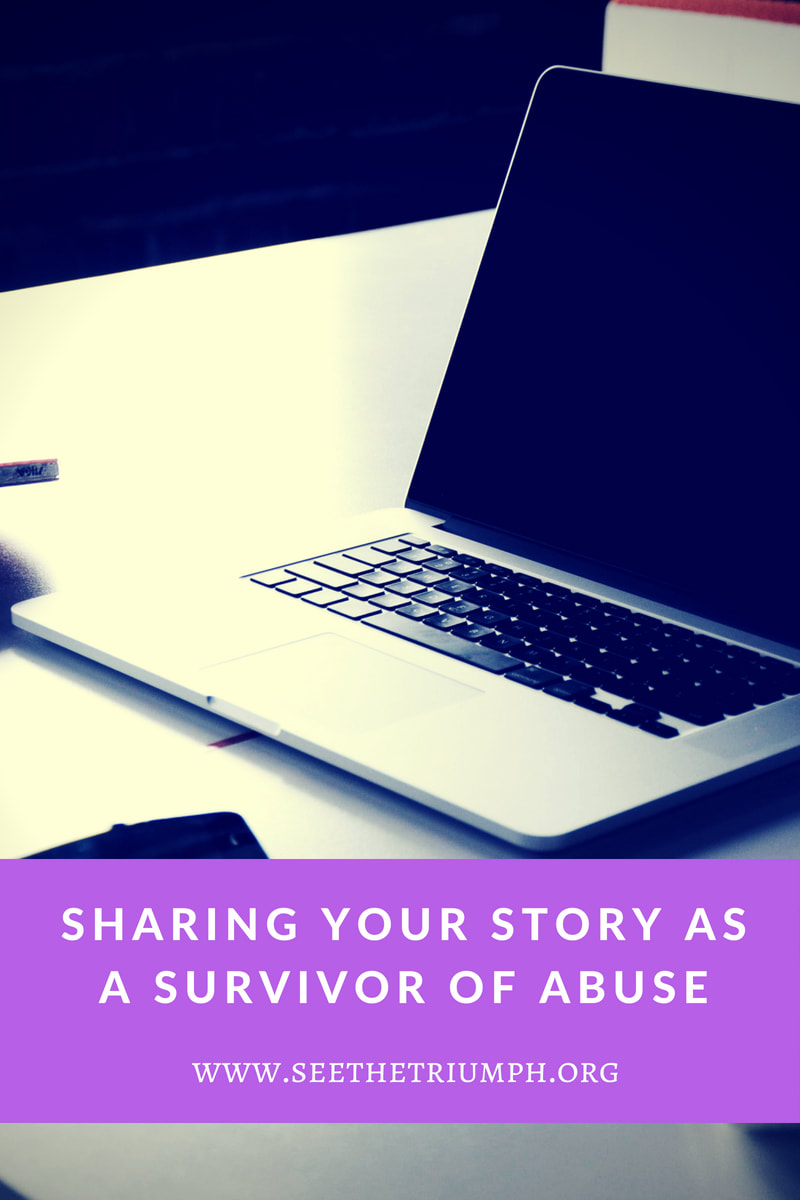|
8/23/2018 Learning Sleep On My OwnBy Colleen Carmichael,* See the Triumph Guest Blogger
Six months. That’s how long it took me to get used to sleeping alone. Each night I would go to sleep on my side of the bed. Each morning I woke up in the same position, having barely moved. I was unable to use the whole bed, to enjoy the freedom of a queen sized bed all to myself. Each night I went to bed with the familiar ache that pieces of my heart were missing. The empty place in my bed confirmed my worst fears; my world was upside down and being torn apart. And so, night after night I went to sleep, rigid in a straight line, with blankets wrapped tightly around me, tucked under my chin. Squeezing my eyes tight each night I prayed for the pain to end, to wake up and find it was all just a terrible dream. But, each morning, I woke up to the bed perfectly made where your body used to lay. Until on morning, six months later, I woke up in the middle of the bed, arms stretched out covering the width of the bed and the covers messed up without discrimination. That morning, as I lay there, I realized I had begun the process of letting go. It was a small step, sleeping in the whole bed, but I also realized I no longer longed for the presence of your body lying next to me. Actually, I was finding sweet relief I no longer had to share a bed with my abuser. Learning to sleep on my own was one of the early gateways to me learning the art of letting go. *Note: Colleen Carmichael is a pseudonym. By Katie Lloyd, See the Triumph Guest Blogger 1. Don’t blame them for the abuse Many survivors of abuse worry that they will be blamed for the what their abuser did to them. They may have experienced this before, as many abusers blame their victims for “making them” abuse them. Absolutely avoid comments that imply that the survivor was to blame. Some of these comments include: “What did you do to make him/her so angry?” “You’re both responsible for your problems” “What did you expect? You chose to stay with him/her, marry him/her, etc.” Abuse is always the fault of the abuser, not the victim. 2. Be kind and empathetic - choose your words carefully You have a unique and powerful opportunity when a survivor shares their story with you. You can respond in a way that supports them and helps them to heal from the abuse. Share what feels natural to you, whether that is letting them know they didn’t deserve the abuse, telling them how much they mean to you, or acknowledging how painful this must have been. 3. Don’t push for details How much detail to share about the nature or specifics of the abuse is up to the survivor. It can feel invasive to be asked about details, and it’s best to let the person you’re talking to share the information that they feel comfortable sharing. 4. Check in about safety It’s always a good idea to check with the survivor you’re speaking with to see if they have any concerns about their safety. The abuse may have ended years ago, but for some survivors the safety risks persist. Ask if there’s anything you can do to help them feel more safe. 5. Reach out Some survivors worry that sharing their story will cause others to treat them differently. In addition to asking what you can do to support them, you might consider reaching out and inviting them to do an activity or just giving them a call to chat. Let them know that you don’t judge them for the abuse. 6. Take care of yourself It can be extremely emotionally difficult to hear stories of abuse, and to hear that this has happened to someone you know can be devastating. You may feel a variety of emotions such as anger, sadness, guilt, and helplessness. All of those emotional reactions are normal and okay. It may help to acknowledge these emotions and take time to do something kind for yourself. 7. Just listen One of the most simple but powerful things you can do for someone sharing something painful with you is to just listen to them. This can be easier said than done, especially when you are trying to manage your own reactions to what they’re saying. To the best of your ability, let them speak and really hear what they are telling you. 8. Respect their privacy Someone who has chosen to share their story with you has placed a great amount of trust in you. Always check with them before talking about their story with someone else. Even people who you think know about the abuse may not. Ultimately, the survivor is the one who gets to decide who hears their story. 9. Try to stay calm You may feel very angry when you hear about the abuse, but keep your temper under control and avoid acting violently or aggressively. For many survivors of abuse, anger is scary and can be a reminder of the abuse even when it is not directed at them. If you feel yourself getting overwhelmed you could ask to take a break from the conversation to calm down. 10. Empower Abuse can be an incredibly disempowering experience. You have the opportunity to remind the person you’re speaking to how strong they are to have survived this experience and to speak out about it now. Katie Lloyd recently graduated with a Master of Science in Counseling and Educational Development from the University of North Carolina at Greensboro with a specialization in Couple and Family Counseling. In her spare time Katie enjoys playing with her dog and traveling.
By Katie Lloyd, See the Triumph Guest Blogger 1. Choose who to share your story with carefully It’s best to choose someone who you trust will be supportive, particularly if you haven’t talked about the abuse much before. You don’t owe it to anyone to share your story with them, regardless of the nature of your relationship or how close you are. Another thing to keep in mind is confidentiality; if you want to keep your story private you might choose to avoid telling people who have a history of gossiping or not keeping secrets. 2. Keep your safety in mind Your physical safety is clearly of utmost importance, but think about your emotional safety as well. Talking about abuse can be an intense experience. Ideally, you will have some coping strategies in mind that you can turn to if you start to feel overwhelmed. Something as simple as taking a break from the conversation, going on a walk, or making a playlist of uplifting songs to listen to can be helpful. 3. Decide how much detail you feel comfortable sharing How much detail you disclose about the abuse is completely up to you. You may find that it is overwhelming to talk about the specifics of what you went through. On the other hand, you may find it therapeutic to discuss details. What details you choose to share may vary depending on who you are talking to or where you are in your healing. 4. Set boundaries Unfortunately, some people have a tendency to ask invasive questions in response to hearing difficult stories. You have no obligation to answer prying questions or talk about aspects of your abuse that you would prefer to keep private. It may be helpful to decide ahead of time how you will respond if someone asks you something that you’re not comfortable answering. One response might be just, “I’m not comfortable talking about that.” 5. Practice self care Think about ways that you practice self care or things that you do to help yourself feel better. Planning to do something positive for yourself, whether that’s taking a bath, eating your favorite food or watching your favorite movie, can help you to cope with some of the difficult emotions that may come up around sharing your story. 6. Consider talking to a professional or joining a support group There can be a lot of power in sharing your story with people you are close to, but you may find that it is also helpful to talk to someone who is more removed from the situation. A professional with experience working with survivors of abuse can help you to gain valuable insight, answer questions, and be a nonjudgmental listener. Additionally, talking to other survivors who have been through similar situations can be very powerful and can provide a different type of support than talking to friends and family. 7. Recognize that you can’t control other people’s reactions Unfortunately, some people may react to hearing your story in a hurtful way. Their reaction is not a reflection on you, it is a reflection on them. If someone reacts in an unsupportive way, make sure to take extra care of yourself emotionally. 8. Think outside the box There’s no right or wrong way to share your story; sitting down and talking about the abuse may not be a good fit for you, and that’s okay! You might consider using writing to share your story, whether that’s journaling privately, posting on a forum or a blog, or even writing a book. Some survivors find that creating art is a powerful way to tell their story. 9. Let others know what type of support you need You’ve probably had the experience of not knowing what to say or do when something horrible happens to a loved one. It’s very likely that the person you’re speaking to wants to do or say the “right” thing, but they may not know what that is. If there is a specific type of support that you want, feel free to let the other person know. You might say, “don’t feel like you have to say anything, I just want someone to listen.” 10. Celebrate your courage Sharing your story requires an enormous amount of bravery. It isn’t easy to put yourself out there and be vulnerable, especially when the subject is something that can carry so much stigma. Give yourself credit for being strong enough to speak about what you have been through. By telling your story you are helping to reduce the stigma around abuse. Katie Lloyd recently graduated with a Master of Science in Counseling and Educational Development from the University of North Carolina at Greensboro with a specialization in Couple and Family Counseling. In her spare time Katie enjoys playing with her dog and traveling. 8/16/2018 When the Church Gets It RightBy Colleen Carmichael (a pseudonym), See the Triumph Guest Blogger
I sat in the parking lot for 30 minutes, and had my first panic attack, before getting up enough courage to get out of my car door and walk through the doors of a new church. I was three weeks separated from my abusive husband and could hardly speak a coherent sentence. I had been told not to return while separated, to my previous church and that the only source of reconciliation was to return and submit to my abusive husband. That wasn’t going to happen. However, I also knew that I, personally, needed thefellowship of a church, the body of Christ to get through this devastation in my life. A thousand thoughts rushed through my mind as I opened and walked through the door of the church. Would they accept me? What will they say when they find out I’m separated from my husband? Will they understand that his abuse is killing me literally, figuratively, mentally and emotionally? Will they care? Is there a bright flashing sign above my head that reads: “Unwelcome. Failure. Worthless.”? It sure felt like it. When I sat down in the back of the church on a Wednesday night, I had no idea the love, acceptance and support I would receive from this group of believers. They were kind. They cared. They listened and encouraged me to follow God. They prayed with me. They prayed for me. The first time I met the Pastor, I blurted out; “I’m separated from my husband due to infidelity and abuse. I don’t want my marriage to end in divorce, but I can’t guarantee that it won’t. Is that going to be a problem? Should I leave this church?” I’ll never forget the gentleness and kindness in my Pastor’s eyes when he replied without missing a beat: “Absolutely not! We are a church that worships and celebrates a God that can take the ugliest and most difficult parts of our lives and redeem them as we continue to follow Him. You are loved here and we will walk this road with you, if that’s what you would like.” I knew in an instant that I was home. My heart began to relax. I silently thanked God for this body of believers who were healthy enough to see the truth of the situation and know that God loves me. My heart began to heal a little bit that night. In the four years following, I have continued to grow and heal in this church. I have been wrapped up in the love God has for me and have been ministered to and encouraged by the wonderful people in that body of Christ. Each week the pastor speaks truth and I know that I don’t have to worry about being manipulated by half truths. One Sunday, I almost fell out of the pew when the pastor was preaching on marriage and he said: “Men it is NOT okay to abuse your wives!” I mean, we all knew that it was wrong…. but I’m not sure I’d ever heard it that clearly from any pulpit! That was the first time I’ve heard my pastor say that, but it isn’t the last! As I’ve healed and made healthy decisions about my future, the pastor has stayed engaged in my life. When he asks how I’m doing, I know he genuinely cares. For the past two years, I have received a scholarship to complete my Masters in Education. I needed someone to be a sponsor for me with the scholarship team…know who stepped up and has served in this position, sending in quarterly reports on my progress? That’s right, my pastor. Know who answers tough questions that roll around in my heart and need Biblical perspective? My pastor. The women in the church include me in their activities, groups and being a part of their families. I attend a Life Group of married couples, who allow me to “do life” with them. We celebrate and encourage each other. I get to see healthy marriages and they get to see a woman walking with her God. The incredible thing is that this is not the only church that has supported me in this process. My parent’s pastor has also stood with me, guided me and helped me through some very difficult, heart-wrenching decisions. Never did either of these pastors, from a conservative denomination, shame me or label me with guilt or shame. They both understood, that abuse was not God’s plan for anyone’s life and blaming the victim for the abuser’s actions would only destroy the victim. Instead, they built me up, in their own ways and through their own congregations to understand that I was truly loved by God and my life continued to have a purpose. They even helped me forgive my previous church who had hurt me so deeply. Today, I am grateful that a panic attack did not stop me from walking through the doors of my now church home. I am grateful for men of God who lead congregations that are committed to following Jesus and loving the hurting, not out of some societal fad but out of a deep love for the grace and mercy that they have received through Jesus. For the past couple of years, I have decided to move forward by clinging to what is good and letting go of what was bad. How can I hold onto anger and bitterness towards a church that acted out of ignorance when I have received such unconditional love, grace and acceptance from the churches God placed in my life? These churches have allowed me to grow, flourish and heal in my journey of recovery and that far outweighs the hurt of the past. To these churches who got it right…who understand what it means to help those who are victims and survivors, I am forever grateful for your generous love, leadership and encouragement in my life! You truly embody the love of Christ! Once a person decides to leave an abusive relationship, it is important to develop a plan for doing so safely. Every situation is unique, so the best approach is to seek help in doing so from a local domestic violence agency or the National Domestic Violence Hotline. This video, developed by See the Triumph Guest Blogger, Bernard Shalvey, offers some tips to consider when leaving an abusive relationship. Bernard Shalvey is a student in the UNCG Department of Counseling and Educational Development's Couple and Family Counseling Master's program. He is preparing to enter his second year in the program. He will be interning at Fellowship Hall beginning in Fall 2018, where he hopes to assist in the treatment of families, couples, and individuals struggling with a variety of issues including addictions and interpersonal violence. He believes in implementing creativity in the therapeutic process and is passionate about helping others.
|
Archives
July 2024
CategoriesAll About Intimate Partner Violence About Intimate Partner Violence Advocacy Ambassadors Children Churches College Campuses Cultural Issues Domestic Violence Awareness Month Financial Recovery How To Help A Friend Human Rights Human-rights Immigrants International Media Overcoming Past Abuse Overcoming-past-abuse Parenting Prevention Resources For Survivors Safe Relationships Following Abuse Schools Selfcare Self-care Sexual Assault Sexuality Social Justice Social-justice Stigma Supporting Survivors Survivor Quotes Survivor-quotes Survivor Stories Teen Dating Violence Trafficking Transformative-approaches |
Search by typing & pressing enter











 RSS Feed
RSS Feed